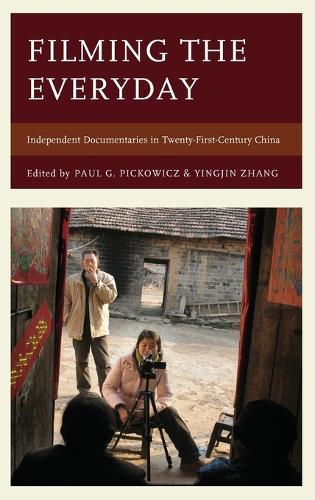Overview
This cutting-edge book examines the rapidly developing scene of Chinese independent documentary, arguably the most courageous player in contemporary Chinese visual culture. The authors explore two areas that are of special interest to China studies and film studies, respectively: (1) filming the everyday in twenty-first-century China to foreground contestation and diversity and (2) exploring the aesthetic of remembering in an embodied documentary practice, which turns the gaze on artists themselves and encourages the viewer’s engagement with the filmed subjects and environment. Highlighting documentary contestation in China, the book traces its cacophony of expressions, some of it featuring confrontations with domineering elites, some of it highlighting negotiations among the independent filmmakers themselves. Their goal is not a “movement” that seeks to establish and impose a single truth, but rather a creative dynamic that fosters a community of tolerance and respects diverse forms of expression. Independent documentary is quite literally a moving target that is witnessing ongoing and widening diversity and complexity when it comes to directors, themes, aesthetics, human subjects, audiences, and impact. The authors stress the enormous potential of cultural production that features non-elites (including amateurs) and that dwells on the everyday, the bottom up, the grassroots, the seemingly mundane, and the apparently marginal. The book’s emphasis on contemporary issues and its discussion of aesthetic experiments will appeal to all readers interested in China’s culture, media, politics, and society.
Full Product Details
Author: Paul G. Pickowicz , Yingjin Zhang
Publisher: Bloomsbury Publishing Plc
Imprint: Rowman & Littlefield
Dimensions:
Width: 16.10cm
, Height: 1.70cm
, Length: 23.80cm
Weight: 0.440kg
ISBN: 9781442270237
ISBN 10: 1442270233
Pages: 212
Publication Date: 15 December 2016
Audience:
College/higher education
,
Tertiary & Higher Education
Format: Hardback
Publisher's Status: Active
Availability: Manufactured on demand 
We will order this item for you from a manufactured on demand supplier.
Table of Contents
Acknowledgments Part I: Cultural Context 1. Introduction: Documenting China Independently, by Paul G. Pickowicz and Yingjin Zhang 2. Who’s Afraid of the Documentary Camera? Refiguring Reality, Memory, and Power in Chinese Independent Documentary, by Yingjin Zhang 3. For Whom Does the Director Speak? The Ethics of Representation in Documentary Film Criticism, by Yomi Braester, Part II: Rural Reconfigurations 4. From Root-Searching to Grassroots: Returning to the Countryside in Contemporary Chinese Fiction and Independent Documentary Film, by Angie Chau 5. Zou Xueping’s Postsocialist Homecoming, by Paul G. Pickowicz Part III: Embodied Filmmaking 6. Looking Back while Marching Forward: Reconfiguration of Selfhood in the Folk Memory Project, by Tong Wang 7. The Memory Project and Other Ways of Knowing: Filmmaking, Affect, and Embodied Knowledge, by Laura Kissel Part IV: Documentary Enactments 8. Gendering Intersubjectivity in New Chinese Documentary: Feminist Multiplicity and Vulnerable Masculinity in Postsocialist China, by Alvin Wong 9. From Bumming to Roaming: Xu Tong’s The Drifters Trilogy, by Yiman Wang 10. Documenting through Reenacting: Revisiting the Performative Mode in Chinese Independent Documentaries, by Hongjian Wang Appendix: Michael Berry, “Memory/Document: In Dialogue with Wu Wenguang’s Memory Project” Documentary Filmography About the Contributors
Reviews
Given the increasing restrictions on the public sphere in China, the unofficial voices represented by independent documentary filmmakers have become a major source for understanding China's past and present, and they serve as a crucial corrective to the uniformity of state-sanctioned packaging of the historical and everyday realities of grassroots China. In honoring the very considerable achievements of Wu Wenguang's commitment to promoting amateur and community voices that are distinct from 'official China' or elite intellectuals, this volume introduces readers to the richness, diversity, and complexity of a China seldom visible from other sources. It builds upon the previous excellent work by Pickowicz and Zhang and should be of great interest to anyone in Chinese studies or film studies. -- Stanley Rosen, University of Southern California If you wanted to understand the actual conditions inside a large American corporation, would you look to an expensive infomercial from the office of the CEO or to amateur footage from the cell phones of dozens of unorganized but concerned employees? There is a parallel in China, where makers of independent documentary films are revealing unrehearsed life that state-sponsored film, by its nature, is obliged to conceal. China-watchers take note. -- Perry Link, University of California, Riverside
Given the increasing restrictions on the public sphere in China, the unofficial voices represented by independent documentary filmmakers have become a major source for understanding China's past and present, and serve as a crucial corrective to the uniformity of state-sanctioned packaging of the historical and everyday realities of grassroots China. In honoring the very considerable achievements of Wu Wenguang's commitment to promoting amateur and community voices that are distinct from 'official China' or elite intellectuals, this volume introduces readers to the richness, diversity, and complexity of a China seldom visible from other sources. It builds upon the previous excellent work by Pickowicz and Zhang and should be of great interest to anyone in Chinese Studies or Film Studies. -- Stanley Rosen, University of Southern California If you wanted to understand the actual conditions inside a large American corporation, would you look to an expensive infomercial from the office of the CEO or to amateur footage from the cell phones of dozens of unorganized but concerned employees? There is a parallel in China, where makers of independent documentary films are revealing unrehearsed life that state-sponsored film, by its nature, is obliged to conceal. China-watchers take note. -- Perry Link, University of California, Riverside
Author Information
Paul G. Pickowicz is Distinguished Professor Emeritus of History and Chinese Studies at the University of California, San Diego. Yingjin Zhang is Distinguished Professor of Literature and Chinese Studies at the University of California, San Diego.
Tab Content 6
Author Website:
Countries Available
All regions
|



